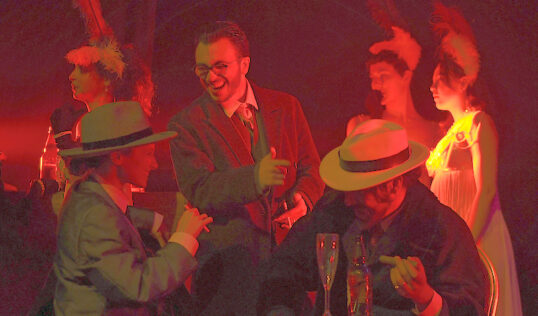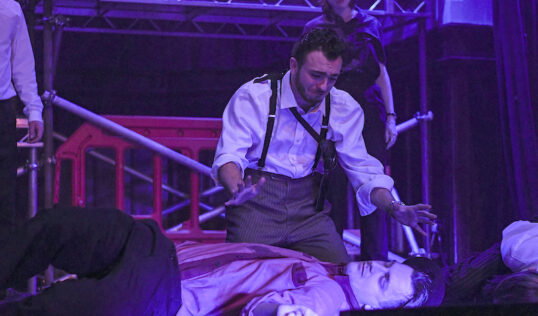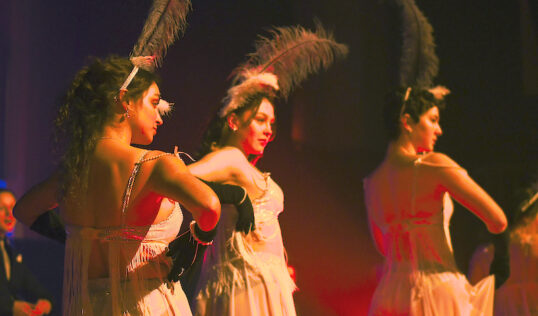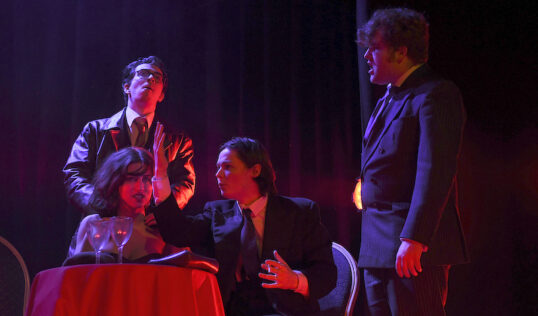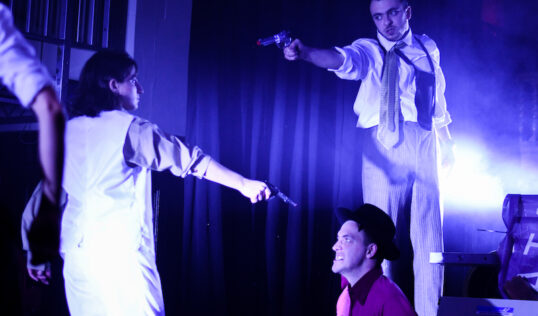Julius Caesar
★★★☆☆ Uneven
Teviot Row House: Wed 1 – Sat 4 Mar 2023
Review by Hugh Simpson
Edinburgh University Shakespeare Company’s Julius Caesar, in the Teviot Debating Hall, is as unpredictable as it is ambitious. It is by turn sublime and ridiculous, well thought out at times and inexplicable at others.
Director Devki Panchmatia has set the production in a 1950s New York underworld, replete with gun-toting, fast-talking hoods.
As usual, anchoring the production in such a recognisable place and time has both advantages and drawbacks. A milieu so concerned with loyalty and honour works well for many aspects of the play, while the Capitol becoming a nightclub is a neat touch.
However, that the conspirators are so concerned with Caesar undermining democracy and becoming autocratic sits peculiarly, as the character is portrayed as a Mob boss – not a figure proverbially eager to rule by consensus in the first place.
Meanwhile, while some of the characters are at home with the accents, others audibly struggle, ending up with a decidedly exaggerated, comedic effect. This, combined with some unconvincing weapons and Victoria White’s gloriously evocative costumes, means that the cast seem permanently on the point of breaking into Sit Down, You’re Rockin’ The Boat.
formidable theatrical intelligence
It is a shame that such barriers to full suspension of disbelief occur, when there is so much about the production that impresses. The very least that can be said about Panchmatia’s direction is that the gangster conceit is carried through with conviction; proof of a formidable theatrical intelligence comes from the performances that are obtained from the cast.
The speaking of Shakespeare’s verse is unusually well done (even if the accents do hamper it) and the whole thing has such fluidity and momentum that the production rarely drags – despite clocking in at over three hours.
The acting area is used exceptionally well, with a great deal of thought put into every moment. This is carried a little too far at times, with the common problem of giving everyone on stage something to do at all times, leading to some moments where the main action is literally upstaged by over-fussy business elsewhere.
all the right notes
The depiction of the characters, however, is excellent. Julius Caesar has been said to be a play without a villain, and it works best when the main players all genuinely believe they are acting for the best. Too often, Mark Antony is portrayed as slick and oily, Cassius as a self-obsessed careerist, or Brutus as ineffectual, which undermines the whole play.
None of this happens here, in a company whose gender-blind casting works admirably. Julia Lisa’s Antony is simply superb, never seeking to dominate but hitting all the right notes. The delivery of the funeral oration that turns the tide against the conspirators is exemplary.
Haig Lucas is suitably noble and conflicted as Brutus, while Tom Wells is strong at conveying the inner turmoil of Cassius. Francesco Davi’s Caesar is too close to the stereotypical mob boss at times, but in a play that (despite the title) is not really about him, this does not detract from the other performances.
Marina Funcasta’s Portia is dignified and human, which can also be said of Izzy Salt’s Lucius. Isabelle Hodgson’s Casca is better than many of the others at treading the line between swaggering, hat-fingering wiseguy and comic turn.
Unlike many modern productions, little attempt has been made to cut or combine the bewildering array of minor characters, who plague the second half of the play in particular. Even with a cast of 21, there is still doubling, which does not always convince. Lucy Melrose is notably strong in the contrasting roles of Calpurnia and Titinius, but elsewhere there is some confusion.
bizarre and unconvincing
There are also a couple of problems that are common throughout many of the cast; too often raised voices and arm-waving are used as a substitute for emotion. A decision to give so many characters cigarettes to hold backfires. As is so often the case now, so few of the cast are used to smoking that they end up pretending to smoke (or even hold the cigarettes) in a variety of bizarre and unconvincing ways that end up as fascinating and distracting.
There is much about the staging that, like the whole setting, is deliberately heightened. Freya Game’s stark lighting and Shira David’s sound work well, but the staging of the various fight scenes is far less convincing, with the unconvincing weapons and less-than-sharp punch-ups having a distancing effect.
A willing jazz band front of stage provides music between the scenes in the first half, but after the interval they disappear to be replaced by burbling electronics. This (coupled with a battlefield set that looks more like roadworks) gives the impression that the second half is a different play from the first. Accents and toy guns aside, the gangster theme is not nearly as clearly present as before the interval.
Even if the setting and execution do not always ring true, there can be no doubt that Panchmatia and the cast have put the maximum of thought and effort in. The end result may be wildly uneven, but the good parts are very good indeed.
Running time: three hours and 15 minutes (including one interval).
Debating Hall, Teviot Row House, 13 Bristo Place, 10 Cambridge St, EH8 9AJ
Wednesday 1 – Saturday 4 March 2023
Evenings: 7.30 pm
Tickets and details: Book here.
EUSC on FacebookL @eushakespeare
Instagram: @eushakespearecompany.
ENDS










